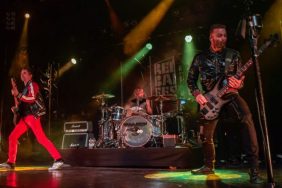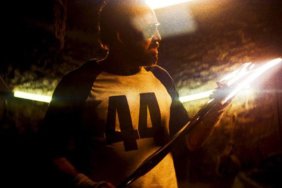If nothing else, Watain are polarizing. Half the reactions to their new album The Wild Hunt, praise the album for being the next evolutionary step in their sound. The other half condemn the album for being too pop oriented. When you toss around words like “pop oriented” in a stance on black metal, it doesn’t mean Watain have suddenly decided to write the Black album part two, or that they’ve turned into Poison. The Wild Hunt still contains the grooves and scratches that make up black metal, eg blast-beats, churning guitars and screeching vocals. That being said, there is a lean towards accessibility.
If asked, I’d say Watain is looking to expand their fan base. Whether you like them or not, a band like Ghost has made the masses cock their heads, and listen to black metal with a less judgmental ear. Watain are starting to become one of those bands that everyone, including mainstream rock acts, site as a big deal. The band’s last album, Lawless Darkness, was their most popular, but was also mired in over produced kitsch. The Wild Hunt moves away from those mistakes, while still keeping an ear to a larger audience.
Watain open The Wild Hunt by unleashing three black metal jams in a row. “Night Vision” gives a taste of melodic intro before the black metal speed crashes through. It’s not as caustic or elemental as most black metal, instead Watain shoot right for epic. Huge guitars, some smashing the riff, others playing melody, fire over the harsh drums.
“De Profoundis” opens right into the easy black metal attack. Fast, fast, FAST!!! That’s the name of the “De Profoundis” game. Watain remove the melody, replacing it with a hammer-attack. Bassist/Vocalist Erik Danielsson screech/growls his way through the song. It isn’t pretty, but it’s not supposed to be. “Black Flames March” maintains the speed, the black metal structures and all the hyperbole that goes with it. Where “De Profoundis” was simply fast, “Black Flames March” also brings in dissonance, and is awash in noisy guitar feedback.
“All That May Bleed” is where Watain step into a more relaxed territory. The riff here is more groove than speed. Even when the speed comes in, Watain hold the groove down. “The Child Must Die” is completely a rock n roll jam. Nothing of Watin’s harsher black metal tendencies. “The Child Must Die” is the type of song Metallica would hear, and then consider Watain to open for them.
Most of the controversy surrounding The Wild Hunt has to do with “They Rode On”. Why the hubbub bub? Well, this is a ballad. I don’t mean a softer black metal or thrash song, I mean a ballad. Acoustic intro, sad, heavy-handed melodies, and Danielsson singing, invoking his best Nick Cave impression. “They Rode On” is nine minutes long and sounds cobbled together from other, better ballads. The intro? Pure “Fade To Black” by Metallica. The solo? Ripped right off the solo from Pink Floyd’s “Mother”. Surrounding this are standard metal solo clichés. It could be a drinking game. Every time “They Rode On” hits a metal cliché, you take a shot.
The rest of The Wild Hunt continues to pave a new, friendlier Watain. “The Wild Hunt” is a cross between doom and more melodic ballad fare. It’s not quite the cheese fountain that “They Rode On” is, but it comes close. “Outlaw” is standard Watain. Closing track “Holocaust Dawn” takes everything we’ve heard thus far, and crams it into a seven-minute metal opus.
With all the varied ideas flowing through The Wild Hunt, it’s never disjointed, and manages to sound like a cohesive album. Is it good? Depends on who you ask. Purists will scream sellout. Though to be fair, this does sound like the next step in what Watain accomplished with Lawless Darkness . New fans will probably dig the catchier jams, and find interest with the more brutal fare. However it is received, The Wild Hunt is a record that manages to push Watain into accessibility, without completely sacrificing their identity.









